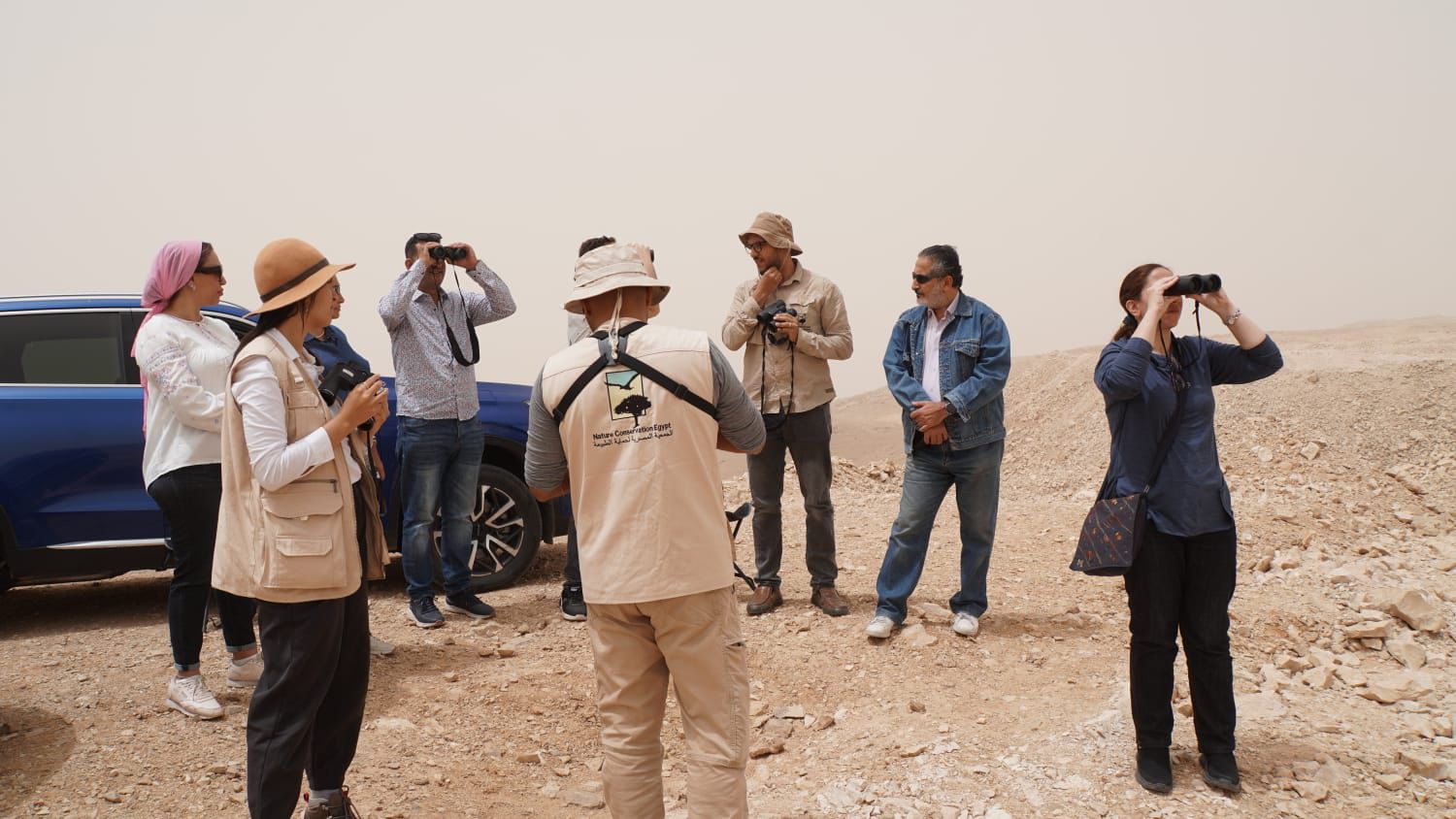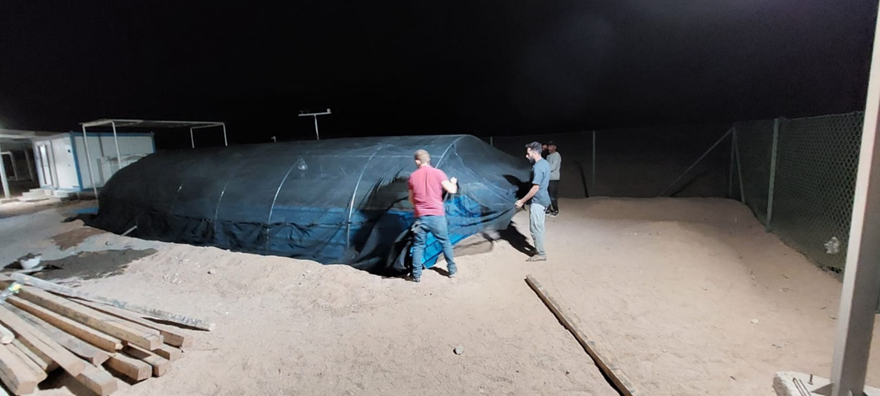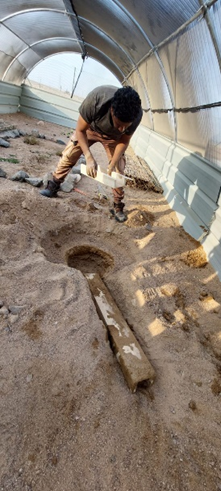
Nature Conservation Egypt (NCE) is an Egyptian NGO working towards conserving Egypt’s natural heritage and promoting its sustainable use for the benefit of present and future generations. Established in 2005 by Egypt’s leading experts in nature and biodiversity conservation, NCE specializes in scientific research, advocacy, education, and outreach to support species, their habitats, and local communities. NCE collaborates with local experts, governmental bodies, and international organisations to ensure efficient conservation efforts within and across borders. As the BirdLife International partner in Egypt and a member of the International Union for the Conservation of Nature (IUCN), NCE drives change through three main approaches: science-based initiatives, advocacy and awareness, and environmental education.
Nature Conservation Egypt (NCE) is dedicated to integrating biodiversity conservation into the renewable energy sector. The organisation aims to balance the country's growing energy needs with the urgent necessity of protecting its rich and diverse wildlife.
NCE is witnessing the ambitious expansion in renewable energy production in Egypt, driven not only by the growing domestic demand but also by the need to cut climate change emissions from fossil fuels. However, this transition to renewable energy production comes with its own set of negative impacts on habitats and wildlife. Renewable energy infrastructure has been reported to cause significant fatalities in various wildlife forms, particularly migratory birds. While most conservation efforts have focused on mitigating the impacts within wind farms, NCE has been paying attention to another significant threat that needs to be adequately acknowledged: bird collisions with transmission powerlines.
One of NCE's landmark achievements is conducting the largest national powerline survey in Egypt, covering about 300 km. This extensive study identified high-risk segments where bird collisions were frequent, leading to a better understanding of how energy infrastructure impacts bird populations. The survey results have been crucial in developing targeted conservation strategies to mitigate these risks. By identifying these high-risk areas, NCE has been able to prioritize conservation actions and work towards reducing bird fatalities caused by powerline collisions. See the summary report here.
In collaboration with the Egyptian Electricity Transmission Company (EETC) and with financial support from BirdLife International, NCE imported and installed bird diverters on 20 km of high-risk powerlines in Sinai that cost 70,000 euros. This initiative aims to reduce bird collisions by making powerlines more visible to birds, particularly during migration periods. The collaboration involved joint efforts between NCE and the Protected Areas of Southern Sinai, EEAA, in conducting the powerline survey, and between NCE and EETC in the installation process. NCE provided the bird diverters, and EETC is currently installing them. The installation of bird diverters is a practical measure that has shown positive results in other regions, and NCE's efforts are expected to significantly reduce bird mortality rates in Egypt. As a responsible Egyptian NGO, NCE not only highlights and pinpoints conservation challenges but also actively participates in resolving these challenges by providing solutions such as the bird diverters, made possible through generous funding from BirdLife International.
Non-Migratory Species Conservation
NCE's philosophy is to fill the gap for essential conservation actions. As an active NGO in the global south, NCE is aware of the colonial discourse of conservation actions and its implications on initiatives and actions on the ground. Since the early 2010s, the biodiversity conservation scene in the renewable energy sector has mainly focused on conserving migratory species, particularly birds. This focus is due to the sincere efforts of bird conservationists, the active international regulatory framework—particularly the CMS convention—and the availability of data on migratory birds, which makes monitoring and evaluating conservation efforts relatively straightforward. However, NCE realized that native biodiversity, often suffering from data deficiency, is frequently overlooked in conservation actions, regardless of its threatened status. An example of this is the threatened native reptile of Egypt, the Spiny-tailed Lizard (Uromastyx aegyptia).
NCE is proud of its significant achievement in local biodiversity conservation within the renewable energy sector. After more than two years of international and national advocacy, NCE celebrated a breakthrough in the conservation project for the threatened Uromastyx aegyptia, one of Egypt's threatened native reptiles. Native reptiles and mammals often go unnoticed in international conservation frameworks due to their data-deficient status. This is where NCE has made a notable intervention to ensure their conservation. This significant conservation work could not have been achieved without the belief and support of AMEA Power, the generous support of the Regional Center for Renewable Energy and Energy Efficiency RCREEE, and the dedicated work of Safe Soar. Such partnerships make effective conservation possible and underscore NCE's impact on biodiversity conservation in Egypt. We conducted a comprehensive field survey on the land designated for the AMUNET Wind Power project before the construction of turbines began. This survey aimed to estimate the population size of the native Uromastyx aegyptia, a species integral to the local ecosystem but threatened by habitat disruption. Our team meticulously identified active and inactive burrows to understand the habitat utilization of the Uromastyx aegyptia. This thorough examination was critical in ensuring the accuracy of our population estimates and the effectiveness of subsequent conservation actions.
Following the survey, we successfully captured and translocated 13 individuals. Each lizard was relocated to a specially designed facility that replicated their natural ecosystem conditions. This environment was crucial for acclimatizing the reptiles to their temporary home while minimizing stress and disruption to their natural behaviours.During a three-month period in captivity, veterinary care was continuously provided, focusing on the health and well-being of each individual. Observations noted an increase in weight among all lizards, a positive indicator of their health and adaptability. This weight gain was an encouraging sign that the lizards were thriving under careful supervision, which is often a precursor to successful reintroducing into the wild.
Consultation and Release
In collaboration with the local community and after thorough consultations, a suitable release site was identified within the landscape of their origin. This location was selected to ensure continuity of the species' natural habitat and social structures. In early June 2024, a well-coordinated release was conducted, reintegrating the Uromastyx aegyptia back into their natural environment. This release not only marked a significant achievement in species conservation but also demonstrated NCE’s commitment to sustainable development practices that harmonize with biodiversity conservation.
Looking Ahead
Building on its successes, NCE is exploring new frontiers in biodiversity conservation within renewable energy projects. The organization plans to expand its research to include more comprehensive assessments of renewable energy impacts on different wildlife groups, including native and local biodiversity of low data availability, which have been underrepresented in conservation studies.
NCE invites all stakeholders in the renewable energy and environmental sectors to join in these efforts. By collaborating on innovative solutions and sharing best practices, we can ensure that Egypt’s renewable energy expansion supports its commitments to biodiversity conservation and sustainable development.


Stay updated with the latest news, trends, and offers by subscribing to our newsletter. Don't miss out on exclusive content and special promotions - sign up today!